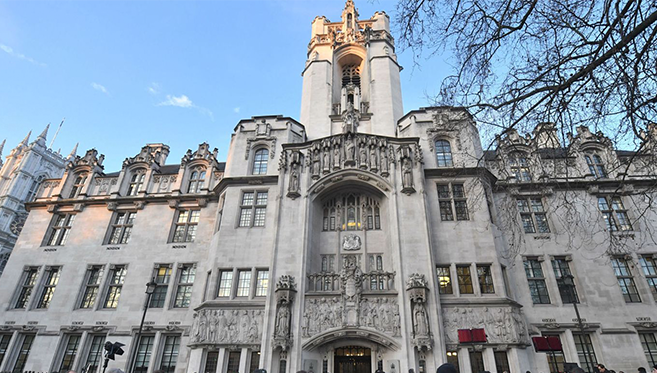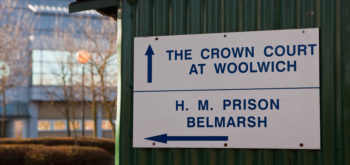Whenever the Supreme Court treads onto terrain that is shared with the political branches, it is often accused of ‘doing politics’. Conservative commentators, often at outlets like Policy Exchange’s Judicial Power Project, imagine the judiciary to be trespassing, forcing their liberal views on an intransigent government. It’s unlikely that such criticisms will be forthcoming after the Supreme Court’s decision on the Scottish Referendum, handed down by Lord Reed this morning.
The justices were faced with two key questions. First, whether they had the authority – or jurisdiction – to hear the case, which had been referred to them by the Scottish Lord Advocate. Second, if they did have jurisdiction, whether the Scottish Parliament could legislate for a non-binding referendum on Scottish independence, or if it was a ‘devolved’ matter – something that was only within the gift of the sovereign Westminster Parliament. In short, the justices said that they could decide the question, but that their answer was ‘no’. The bill was beyond – or ‘outwith’ in Scots – the authority of Holyrood.
If the justices really had wanted to remain bystanders on the question of Scottish independence, they had an easy way out. Many academic commentators thought that the question was hypothetical, and not yet ripe for judicial consideration. The Scottish government had not put the bill before Holyrood, let alone put it up for a vote. Under s.33 of the Scotland Act, which deals with the question of references to the Supreme Court in cases like this, any reference should come after the legislation has been passed by Holyrood and before royal assent for the bill has been granted. As the Advocate General argued, it would be ‘surprising’ for the UK Parliament to ‘set up a scheme for the reference of bills’ to the Supreme Court, but to also let references be made outside of the scheme.
Lord Reed and his brethren were not persuaded the Attorney General’s argument. Instead, they found that while s. 33 meant that a bill could not be referred after it had been introduced in Holyrood, ‘it does not follow that a reference cannot be made…before’. Rather than that section being the sole way by which references could be made to the Supreme Court, it was a way, with the UK Parliament intending to ensure that ‘every conceivable question’ about devolved competence could be ‘decided by the courts’.
Perhaps the justices took the view that declining jurisdiction at this juncture would have simply delayed the inevitable. If the SNP had proceeded with the bill, the strength of their majority and their determination to hold a referendum in pursuit of independence meant that the question of the legislation’s legality would have eventually made its way back to the justices at Parliament Square again. Deciding the issue now headed the question off at the pass. This was particularly so given the framing of the legislation, with nothing in the Scotland Act prohibiting the Lord Advocate from making a reference at any other time. The consequence of this interpretation may have been that the Supreme Court a question that the legislation delegated to the Lord Advocate, but as the justices noted, she could be mistaken, ‘with the consequence that a legitimate and politically important proposal for legislation will never see the light of day’. Ensuring that the Lord Advocate had an ‘authoritative judicial decision’ on the point was ‘more consistent with the rule of law’.
It is a shame that the justices were willing to recognise that members of the executive make mistakes, yet are all too often unwilling to scrutinise the legitimacy or rationale of executive decisions in cases like Shamima Begum’s, where they prefer to defer to ministerial judgment. Yet, setting this aside, the logic of the Court is sound. The question was not hypothetical – it directly affected the actions of the Lord Advocate – and it was clearly envisaged within the legislation for the Lord Advocate to have the authority to make references.
From here, the rest of the judgment returned to more expected terrain, even if you didn’t expect the justices to get quite so far. The Lord Advocate may have had the authority to make the reference, but the justices held that Holyrood does not have the authority to pass legislation holding a referendum on the question of ‘should Scotland be an independent country’. This decision is wholly in-keeping with the fact that when power was devolved to Scotland, the UK Parliament ‘reserved’ certain matters, refusing to give the Scottish Parliament the power to decide them. These generally concerned matters that went to the ‘integrity of the UK’, such as foreign affairs and defence. For the Court to have concluded that legislation for a referendum on the literal integrity of the UK as a state was not reserved would have been astonishing, if not absurd.
The Scottish government tried to get around this all too obvious obstacle by claiming that the referendum would not have any legally binding effect. Much like the Brexit referendum, no legal consequences would flow from the vote itself, regardless of its outcome. If the Bill existed in a legal vacuum, these arguments would have had some merit. The Scotland Act reserved questions of the UK’s integrity to Westminster. The Bill would have no direct legal consequences for the UK’s integrity. Therefore, the Bill was within Holyrood’s competence.
Lord Reed had little time for this. Acknowledging that the ‘referendum would not be self-executing’, he observed that ‘its practical effect would be politically significant’, and would ‘place political pressure on the UK Government and Parliament to respect the result…’. While courts might be often concerned with the direct effect of legislation, when it comes to interpreting the meaning of a statute, that is not all that matters. ‘What these provisions are really about’, in terms of what they are aiming to achieve, must also be considered. As the Lord Advocate submitted, the prospective Bill was of ‘fundamental constitutional and public importance’, and as the drafters knew when writing the Scotland Act, they were not concerned with only reserving matters to Westminster that would have an inexorable legal effect, but that would have an effect on the politics of the nation as well.
International law was given equally short shrift. There may be the right for self-determination (a right that the Scots were given only a few years ago), but like the Canadian Supreme Court held in 1998, it is one that is primarily concerned with ‘former colonies; where a people is oppressed; or where…meaningful access is [denied] to government’. None of these apply to Scotland. The SNP may be unhappy that it must still bend the knee to Westminster, particularly one run by an intellectually moribund cabal, but as the justices held, being politically unhappy is not something that can be remedied by appealing to international law.
This court has an unfortunate tendency to be deferential. All too often, it chooses to let the decisions of the executive go unchallenged and unscrutinised, letting the fact they have been made be enough to justify their legality. Here, it had no executive decision to defer to, with the Lord Advocate putting the question, unanswered, before the Supreme Court justices. Nonetheless, once the Court decided to answer it, the outcome was never really in doubt. The Scotland Act was designed to preserve the integrity of the UK, not to tear it apart, and vague principles of self-determination were – rightly – thoroughly unpersuasive. Lord Reed’s court might have an unfortunate tendency to be conservative (with a small c) in many cases, but this wasn’t one of them.







